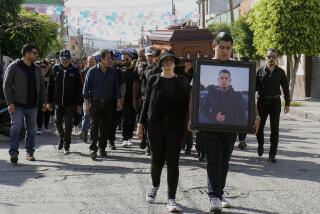Spain’s Innocent Victims of Terrorism Battle for Government Support
- Share via
MADRID — On Nov. 22, 1988, a car bomb killed Luis Delgado’s 2-year-old son, disabled his wife and wounded him. Every day since, he has asked himself: “What if I had gone by a second earlier?”
“Maybe nothing would have happened” if they had driven past the Civil Guard headquarters sooner, he said. Or, “a second later, maybe we’d all be dead.”
Few other people remember little Luis, one of 17 children and 786 adults killed by terrorist acts in Spain since 1968, even though his death was front-page news for a day.
That is more attention than most victims get in a country accustomed to politically motivated terrorism, which often claims innocents.
The father cannot forget and has dedicated himself to making sure that the government at least takes care of innocent civilian victims--the maimed, widows and orphans terrorism leaves behind.
As head of the Assn. for Victims of Terrorism, the 34-year-old physician leads a public campaign to increase pensions and other benefits for those whose cases have fallen through the cracks of government bureaucracy.
“The bad guys are the terrorists and the government has to protect the victims’ rights better than it does now,” he said in an interview.
Official statistics indicate that terrorism is declining in Spain: 28 people killed and 173 wounded last year, compared to a peak death toll of 124 in 1980.
Cross-border arrests by Spanish and French police have crippled the leadership of ETA, a Basque group seeking independence for Spain’s three Basque provinces. Its violent campaign accounts for 80% of the deaths.
ETA responded by shifting its weapons of choice from pistols at close range to booby-trapped cars and remote-controlled bombs.
A generation after Civil Guard officer Jose Pardines became the first ETA victim in June, 1968, most of the casualties are unlucky civilians like Delgado’s son and Diego Montes, 12, who played soccer at the wrong time and place.
On March 16 in San Sebastian, Diego was walking home with his father when a car bomb exploded nearby, killing a member of the paramilitary Civil Guard. The boy was seriously wounded and taken to a hospital with four other passersby.
Diego is covered by a law providing special payments and pensions to direct and indirect victims of terrorism, but it applies only to deaths or injuries since Jan. 1, 1987. Survivors of civilians killed before that receive pensions based on how much money the victim had paid into Spain’s social security system.
Sonsoles Alvarez, who joined with other widows to found the victims’ association, said Spain needs “a single law that treats everyone equally and deals with indemnities, pensions, hospital bills--complete coverage by the state.”
Britain pays compensation for injury or death caused to civilians by violent offenses, including terrorism connected with Northern Ireland, and has a special office to review the claims. In Germany, benefits are automatic for widows or other heirs of terror victims.
Alvarez, who has six children, was widowed when an explosion at a Zaragoza hotel killed her husband, a cavalry officer, and 37 other people in 1979. She and her sister were wounded.
As the widow of a military officer, she was fully covered, but civilian victims have been unable to claim special compensation because the cause of the explosion never was determined.
With financial help from the Interior Ministry, Alvarez and other widows formed the association as a means of dealing with the government bureaucracy.
It now has a six full-time employees, several consulting lawyers and an annual budget of nearly $300,000 to pay for scholarships and supplemental aid to victims.
“What the association does is cover those things the state fails to,” said Juan Antonio Corredor.
Corredor, a former Civil Guard, lost the use of his right arm in a 1985 bombing that killed an American passerby in 1985. He was 22.
Augustin Valladolid, an Interior Ministry spokesman, acknowledged that some civilian victims and their families have had problems getting compensation, but said legislation was being prepared to fill the gaps. He said the government had paid out $70 million since 1980.
Valladolid said his ministry had assigned two staff members to help victims with applications and he hoped to work with the association to create an information center for victims.
Money also will be allocated for faster payments to people wounded by terrorist acts, who now must wait until they are discharged from the hospital to file claims.
The government did not anticipate the high number of civilian casualties and did not act quickly enough on compensation, Valladolid said, “but the process is going to get easier and easier.”
More to Read
Sign up for Essential California
The most important California stories and recommendations in your inbox every morning.
You may occasionally receive promotional content from the Los Angeles Times.













